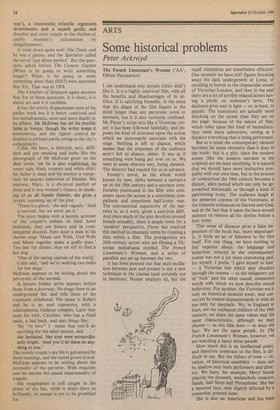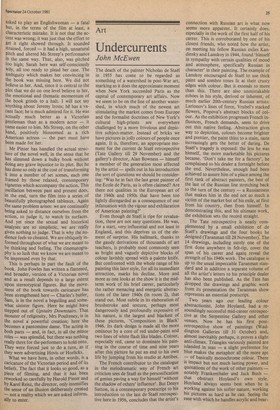ARTS
Some historical problems
Peter Ackroyd
The French Lieutenant's Woman ('AA', Odeon Haymarket) I can understand why certain critics didn't like it. It is a highly contrived film, with all the benefits and disadvantages of its artifice. It is satisfying formally, in the sense that the shape of the film lingers in the mind longer than any particular scene or moment, but it is also curiously confined. Mr Pinter's script acts like a Victorian corset: it has been followed faithfully, and imposes the kind of strictness upon the action which we customarily associate with the stage. Nothing is left to chance; which means that the responses of the audience aren't left to chance, either. It was as if something were being put over on us. We were in some obscure way, being cheated. The director had reacted for us in advance.
Fowles's novel, as the whole world knows by now, shifts between a narrative set in the 19th century and a narrator comfortably positioned in the 20th who comments upon the action in a sometimes sympathetic and sometimes half-ironic way. The conventional superiority of the narrator is, as it were, given a cast-iron alibi. And since much of the plot devolves around female sexuality, there is ample room for a 'modern' perspective. Pinter has resolved this method in cinematic terms by creating a film within a film. The protagonists are 20th-century actors who are filming a Victorian melodrama entitled The French Lieutenant's Woman, and a series of parallels are set up between the two.
It has been pointed out that such oscillation between past and present is not a new technique in the cinema (and certainly not in literature: Homer employs it), but the rapid transitions are nonetheless effective. One moment we have stiff figures brushing away the dark undergrowth of Lyme, or recoiling in horror in the crepuscular streets of Victorian London, and then in the next there are a lot of terribly relaxed actors having a picnic on someone's lawn. The darkness gives way to light — or, at least, to pastels. The transitions are actually more shocking on the screen than they are on the page: because of the nature of film, which relies upon this kind of immediacy, they seem more subversive, setting at a distance everything that is being performed.
But as a result the contemporary element becomes far more obtrusive than it does in the book: this is a pity, since the modern scenes (like the modern narrator in the original) are the least satisfying. It is natural that we should have more instinctive sympathy with our own time, but in the process of comparison the 19th century becomes a distant, alien period which can only be approached historically or through a kind of patronising irony. The audience laugh at the apparent coyness of the Victorians, at the frequent references to Darwin and God, and at the fact that it takes the hero several minutes to remove all his clothes before a love scene.
This sense of distance gives a false impression of the book but, more importantly, it lends an air of falseness to the film itself. For one thing, we have nothing to feel superior about: the language and behaviour evinced in the contemporary scenes was not a jot more convincing and, for myself, I prefer 'I gave myself to him' a Victorian line which sent chuckles through the cinema — to the obligatory use of 'fuck' and the other casual, unemotive words with which we now describe sexual behaviour. For another, the Victorian era is only an historical moment away, and cannot yet be treated dispassionately or with an eye only for spectacle. We, in England at least, are the orphaned children of the 19th century; we share the same values and the same characteristics, although we may choose — as this film does — to deny the fact. We are the same people. In The French Lieutenant's Woman, however, we are watching a fancy dress parade.
How much this is an intellectual point, and therefore irrelevant to the film, is difficult to say. But the failure of tone — or, rather, of historical sensibility — does cast its shadow over both performers and director. We have, for example, Meryl Streep playing the doomed, melancholy creature, Sarah, half Siren half Persephone. She has a haunted face, only slightly affected by a somewhat pointed nose.
She is also an American and has been asked to play an Englishwoman — a fatal but, in the terms of the film at least, a characteristic mistake. It is not that the accent was wrong; it was just that the effort to get it right showed through. It sounded strained, forced — it had a high, unnatural Pitch and altered Ms Streep's performance in the same way. That, also, was pitched too high; Sarah here was self-consciously Wily, all too ready to plead her case. The ambiguity which makes her convincing in the book was missing here. We did not believe in her. And, since it is central to the plot that we do on one level believe in her, the emotional and thematic momentum of the book grinds to a halt. I will not say anything about Jeremy Irons; he has a vacant face; he is much admired for it. He was actually much better as a Victorian gentleman than as a modern actor — it came easier to him. Ms Streep, on the other hand, positively blossomed as a rich American actress — the part must have been made for her.
Mr Pinter has handled the actual structure of the novel well, in the sense that he has slimmed down a bulky book without doing any grave injustice to its plot. But he has done so only at the cost of transforming it into a number of set scenes, each one framed by those relaxed, contemporary Vignettes which accompany the action. This oscillation between past and present does, in the end, turn the film into a series of beautifully photographed tableaux. Again the same problem arises: we are continuallY being asked to distance ourselves from the action, to judge it, to watch its surfaces. And yet since the sexual and historical analyses are so simplistic, we are really given nothing to judge. That is why the audience feels so cheated. We are obliquely informed throughout of what we are meant to be thinking and feeling. The cinematography is so lush that we know we are meant to be impressed even by that This is perhaps in part the fault of the book. John Fowles has written a flattened, and broader, version of a Victorian novel and as a result depends to a large extent Upon stereotypical figures. But the movement of the book towards caricature has been strengthened here — Charles's butler, Sam, is in the novel a beguiling and somewhat sinister figure. Here he might have stepped out of Upstairs Downstairs. That monster of religiosity, Mrs Poulteney, is in the novel a powerful creation; here she 'becomes a pantomime dame. The acting in both parts — and, in fact, in all the minor roles — was splendid, but there was nothing really there for the performers to hold onto. They were forced just to do a turn, as if they were advertising Hovis or Horlicks.
What we have here, in other words, is a caricature of the Victorian period and of its beliefs. The fact that it looks so good, as a Piece of filming, and that it has been reworked so carefully by Harold Pinter and by Karel Reisz, the director, only intensifies the sense of an illusion deliberately created — not a reality which we are asked informally to enter.



































 Previous page
Previous page